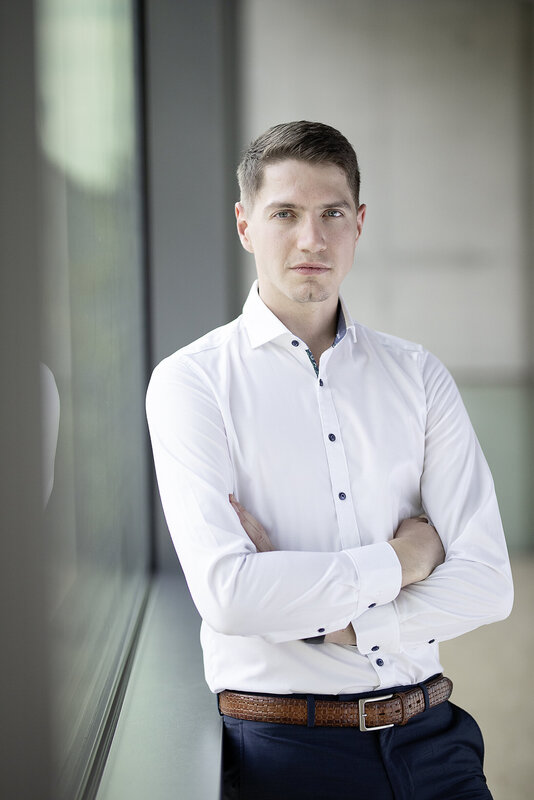WHU alum Lukas Linnig and his team are researching new cancer treatments
Graduates of WHU – Otto Beisheim School of Management are encouraged to have a positive influence on the world throughout their lives. Akribion Therapeutics is one such way this has manifested. Co-founded by WHU alum Lukas Linnig (EMBA 2022), the company is currently working on a new, revolutionary cancer treatment that does not damage healthy cells. Their breakthrough progress could give numerous patients continued hope of beating the disease. Though born of the research conducted at the Hesse-based BRAIN Biotech, the company is its own entity. We spoke to Lukas Linnig about why it was necessary for him and his team to strike out on their own—and about the potential of their new method of treatment.
Lukas, you helped found Akribion Therapeutics last year. Your team’s hope is ultimately to find a cure for cancer. What are you currently working on, and how did you come to work in this field of research?
Akribion Therapeutics is developing an entirely new class of treatments that target and destroy cancerous cells. Our technology makes use of an enzyme that specifically attacks these cells while protecting those that are healthy. Our team at BRAIN Biotech had spent years researching enzymes that perform different functions and, somewhat randomly, they happened to stumble upon G-dase E. Our understanding that this particular enzyme had the capability to attack specific cells is what led us to further develop our concept with a focus on oncology.
Your company is still rather young. What do you hope to achieve and develop in the coming five to ten years?
We want to take our enzyme out of the pre-clinical research phase and into the clinical development phase. Our goal is to start clinical trials sometime within the next five years to ensure the security and effectiveness of our treatment. In the long term, over the next ten years, we will strive for medical approval and the widespread implementation of our treatment in the field of oncology. At the moment, we are also working on making our platform more robust based on additional indicators so that it can be applied in a whole range of other areas.
Getting Akribion Therapeutics on its feet required some fairly significant action on your part: You left your executive financial position at BRAIN, with your business partner following suit not long after. Why was it so important for you both to strike out on your own for this project?
Developing new medicines requires a strategy that is completely different from what industrial biotech projects would. This project requires a focus on its own pipeline, clinical trials, and regulatory parameters, all of which bring their own set of challenges best tackled by companies that specialize in those areas. And apart from that, investors need to have a clear picture of the financial risks that come with working in highly innovative industries—including pharmaceutical development. Establishing Akribion Therapeutics as its own business has given us the independence necessary to invest funds in the development of new treatments. That would not have been possible if we were under BRAIN’s umbrella, as the financial resources available there could not have covered the cost of development. Not only that, but securing financing through BRAIN’s own investors would have been unrealistic due to the very different risk profile our project has.
Your research into the use of RNA biomarkers to destroy infected cells—without damaging those that are still healthy—has enormous potential. Yet, there is still the risk that, after all is said and done, no cure for cancer will be identified. How do you convince investors to take on such a risk?
Venture capitalists, especially those active in biotechnology, understand that innovation and risk are inextricably linked. You need to present investors with an idea that has a solid scientific foundation, and you need to define clear milestones for continued development. Our technology is based on sound data, and we have a team that possesses profound experience in biotechnology. Additionally, the market potential is enormous: The ability to selectively eliminate cancer cells without affecting healthy cells could mark a total shift in how we treat cancer patients. Scientific evidence, a strong team, and great market potential—that is how we convinced investors to support us at this early stage.
You graduated from the Kellogg-WHU EMBA Program in 2022. How did the program make it easier for you to set up your company so shortly after?
The EMBA program gave me valuable tools for starting and managing a company. The network I built up while at WHU, as well as the program pushing us to think strategically in complex environments, were particularly helpful. Partnerships, financing, and scaling play a central role in biotechnology. The program helped me address these aspects systematically. Additionally, WHU’s entrepreneurial focus encouraged me to take the step out of the corporate world and into the start-up world.
Thank you very much for the interview and good luck for the future.

